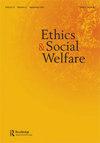‘Helping Not Hurting’: Horizontal Care and Learning to Peer Care in Prison
IF 0.9
Q4 SOCIAL WORK
引用次数: 0
Abstract
ABSTRACT Over the past two decades, the proportion of older prisoners has increased dramatically from 7 to 17 per cent of the total prison population in England and Wales. This is problematic as their needs are holistically different to their younger counterparts and prisons are not designed for issues associated with older adulthood. Increases in human frailty, disability and dependency raise numerous financial and managerial issues for prison administrators. These issues are set against a backdrop of reduced funding, overcrowding, increasing violence, increasing self-harm and suicide. The study investigates existing low-level, preventative peer caregiving practices, examining the factors that constrain or promote care giver/receiver relations in a prison setting. The aim of the study is to contribute to new understandings that can mitigate the effects of an increasingly ageing and infirm population, by developing the amount and quality of peer caregiving. Data were collected using mixed qualitative methods, namely, participant observation and interview. Prisoner peer caregiving is identified as a relatively new discourse and practice that is in tension with better established discourses and practices of security, control, and managerialism. Developing models of horizontal care, supported by social forms of learning are recommended as contributing to improving peer care practice in prisons.“帮助而非伤害”:监狱中的横向关怀与同伴关怀学习
摘要在过去的二十年里,在英格兰和威尔士,年长囚犯占监狱总人口的比例从7%急剧上升到17%。这是有问题的,因为他们的需求与年轻人的需求完全不同,监狱也不是为老年人相关的问题而设计的。人类虚弱、残疾和依赖性的增加给监狱管理人员带来了许多财务和管理问题。这些问题是在资金减少、过度拥挤、暴力增加、自残和自杀增加的背景下发生的。这项研究调查了现有的低水平、预防性的同伴照顾做法,考察了在监狱环境中限制或促进照顾者/接受者关系的因素。这项研究的目的是通过提高同伴护理的数量和质量,促进新的理解,从而减轻日益老龄化和衰弱的人口的影响。数据采用混合定性方法收集,即参与者观察和访谈。囚犯同伴看护被认为是一种相对较新的话语和实践,与安全、控制和管理主义的更成熟的话语和做法相矛盾。建议在社会学习形式的支持下发展横向护理模式,以有助于改善监狱中的同伴护理实践。
本文章由计算机程序翻译,如有差异,请以英文原文为准。
求助全文
约1分钟内获得全文
求助全文
来源期刊

Ethics and Social Welfare
SOCIAL WORK-
CiteScore
1.60
自引率
20.00%
发文量
36
期刊介绍:
Ethics and Social Welfare publishes articles of a critical and reflective nature concerned with the ethical issues surrounding social welfare practice and policy. It has a particular focus on social work (including practice with individuals, families and small groups), social care, youth and community work and related professions. The aim of the journal is to encourage dialogue and debate across social, intercultural and international boundaries on the serious ethical issues relating to professional interventions into social life. Through this we hope to contribute towards deepening understandings and further ethical practice in the field of social welfare. The journal welcomes material in a variety of formats, including high quality peer-reviewed academic papers, reflections, debates and commentaries on policy and practice, book reviews and review articles. We actively encourage a diverse range of contributions from academic and field practitioners, voluntary workers, service users, carers and people bringing the perspectives of oppressed groups. Contributions might include reports on research studies on the influence of values and ethics in social welfare practice, education and organisational structures, theoretical papers discussing the evolution of social welfare values and ethics, linked to contemporary philosophical, social and ethical thought, accounts of ethical issues, problems and dilemmas in practice, and reflections on the ethics and values of policy and organisational development. The journal aims for the highest standards in its published material. All material submitted to the journal is subject to a process of assessment and evaluation through the Editors and through peer review.
 求助内容:
求助内容: 应助结果提醒方式:
应助结果提醒方式:


